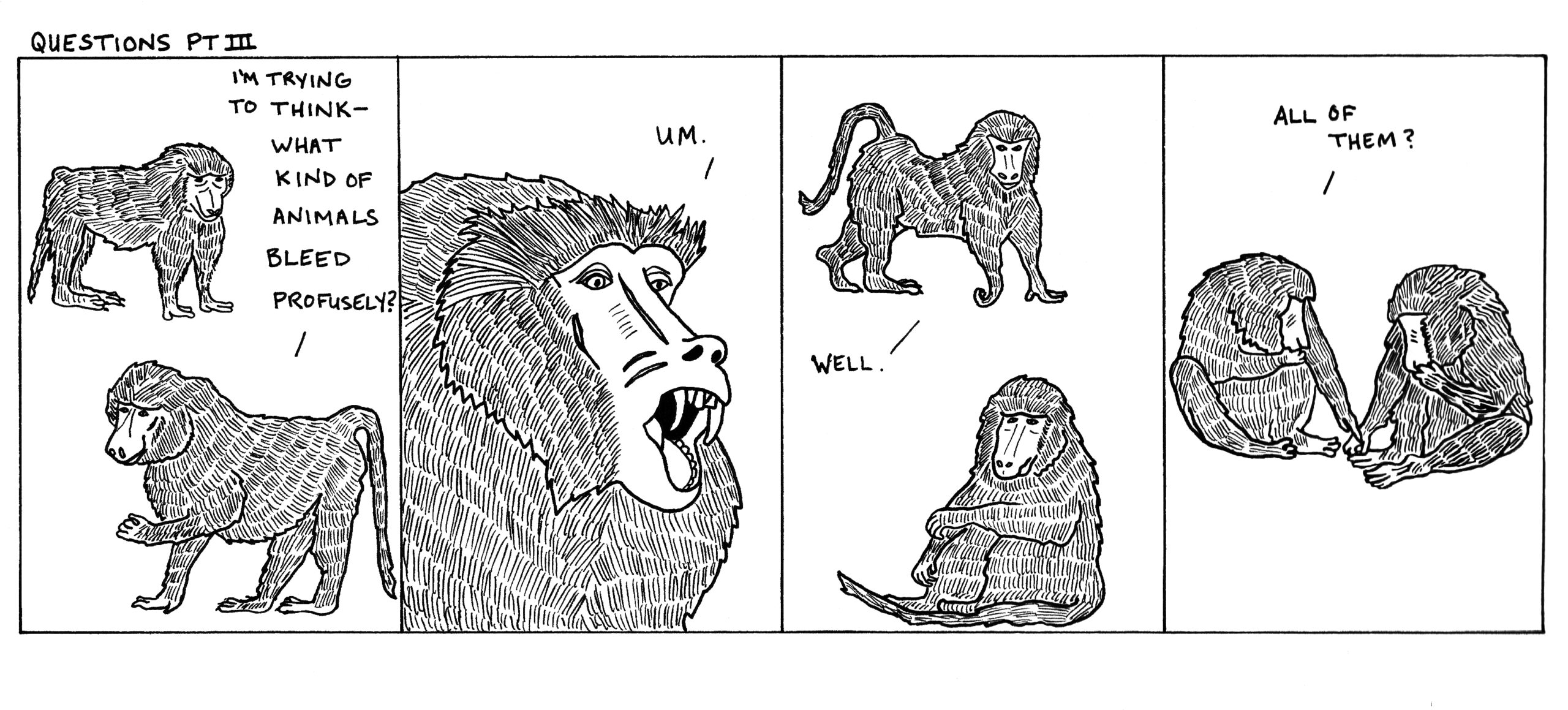Welcome. If you happen to be new to this website because you saw my comics up at The Rumpus, I’m glad you’re here! I post new comics every Wednesday (barring, though sometimes in the face of, personal tragedy), and happily accept animal requests via email (though I make no promises to honor them).
Oh, and there happens to be free shipping available right now (through April 14th) from the site that sells my tshirts, in case you like that kind of thing.
Now! More common than shilling merch, in this space, is the posting of literary links & essays & thoughts on whatever is going through my mind. Like this: apparently the man who founded Arcosanti: The City of the Future passed away yesterday. Sad, because he was a human being willing to pursue a somewhat mad but beautiful dream. The world will miss you, Paolo Soleri.
(And if you live anywhere near Arizona, you should most definitely visit Arcosanti. It’s open to the public, lovely, and bizarre.)
Finally, I’ve been reading and re-reading Pnin. In the past, I’ve always been more of a Pale Fire girl, as Nabokov-novels-that-are-not-Lolita goes, but Pnin is the book that I see the most passing references to when artists & writers are asked about their influences. I hadn’t re-read it since college, so I picked it back up for a recent trip.
Here’s what happens, in a nutshell: we follow a somewhat daffy Russian emigre, who teaches at an American small liberal arts college and has seen a great deal of personal disappointment. He gives a talk. He visits friends. He moves, because it’s difficult for him to concentrate. He remembers.
The book is interesting, because the main tension comes not from any single event to which we, as readers, are witness. Instead it slides in subtlely, through the cloaked hostility and monomania of the narrator. For most of the book, we are given little (though not no) reason to even view the narrator as a separate character, but by the end we learn that he has popped up periodically in Pnin’s life, and is a malign influence. A liar. A memory thief. Once we know this, it’s impossible not to revisit the pages we’ve already read – many of which are tender, even loving towards Pnin (but many of which are mocking) – and wonder how much of what we read there would line up with Pnin’s view of his own life.
In the end, Pnin flees, and we see no more of him. Nabokov is known to have said (well, that is I remember hearing that he said this, but I’m not sure where to find a quote) that Pnin is one of only two characters of his who escaped, and whom he (Nabokov) respects. (The other is Lolita.)
This is heartbreaking twice. Once, because we have come to love Pnin, and see that we are complicit in one more instance of his life being wrested from his control. And twice, because it’s impossible not to read the book as a statement on the tyranny of narrators generally – meaning that Nabokov knew he was doing harm to Pnin, and did it anyway. (So maybe it’s heartbreaking, in fact x3, because we that last bit is sad both for Pnin and Nabokov.)
It’s complicated to explain why I find that so wrenching – I don’t believe, not for one instant, that writers have a moral obligation not to hurt their characters. That would be so boring! It would give us so much less! I’m glad Nabokov wrote this book, glad he did this to Pnin. But forces us to confront the fact that in our own lives we are all tyrannical narrators, revising our interactions with others and reframing their (those others’) existences to fit in with the narrative we’re devising. And that’s sad. And that’s life.
The funny thing is that this thievery is not meant to be sad – it’s how we try to get close to one another: by putting another person’s experience into terms we can understand. Our own terms. But no one else thinks quite in our terms! So we are always changing reality to suit our own ends. Oh well for all of us.
One last thought: Pnin actually bears a strong resemblance to Charles Kinbote, the mad narrator of Pale Fire (as you’ll recall, my other favorite). Kinbote, too, is a sad and misunderstood emigre teaching at a small liberal arts college. But even though he actually narrates much of Pale Fire, he never escapes Nabokov’s grasp. Everything we know about him comes through someone else’s lens.
